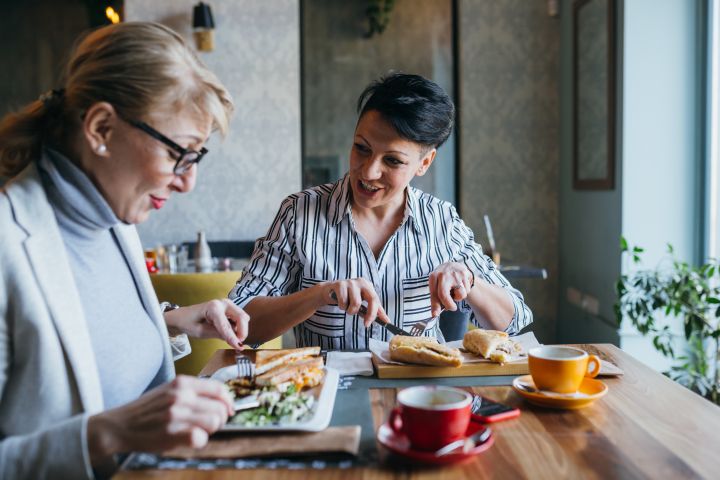While all sets of manners are important to learn, table manners are among the most necessary ones to know, especially for ladies who like to conduct themselves as elegantly and gracefully as possible.
Table manners come in handy more frequently than any other, after all, we eat multiple times every day with company varying from family and friends to business colleagues and clients.
To help you ease through any dining experience with utmost polish, in this article we’re discussing essential table manners for ladies.
Keep reading to avoid being branded “the sloppy eater” of the group!
If you don’t have time to go through all the tips below, here’s a quick summary:
- Unless you’re called out of town because of business or experience a family or personal emergency, attend the dinner if you’ve responded a yes. If such an emergency comes up, let your host know as soon as possible.
- Know the context of the event so you can dress accordingly.
- Bring your host or hostess a gift.
What’s the Purpose of Table Manners?
It doesn’t matter how old you are, what social status defines you, or how much money you make, table manners exist to serve two main purposes.
First, table manners are there to make you, as well as those around you, comfortable. Raise your hand if you ever had to dine with someone who had filthy hands, chews with their mouth open wide, or coughs all over the food so you get to watch the undigested bits of their food flying around the table.
If you don’t want to be that person and want others to stop acting as such, sticking to proper table manners is the only solution.
The second purpose of practicing table manners is to save ourselves from embarrassing moments. You won’t drink from someone else’s water glass because you know yours is on your right, and you won’t be caught halfway your soap when the host says: “Bon Appetit” because you know you shouldn’t start eating until the host does.
Exhibiting table etiquette allows you to feel confident when you sit down at a table, whether it’s a semi-casual dinner date. A laid back family feast, or a formal dining setting with a six-course menu at a luxurious restaurant.
Even if most of the dinners you attend are informal, such informality means you should focus on how to hold a conversation as you eat, how to address people as they east, what topics are off-limits, and many more aspects. In other words, informality doesn’t mean you should throw table manners out of the window!

Before the Event
Proper table manners for ladies don’t start when you’re actually at the table, but rather from the moment you received an invitation for the event. These include RSVPing, dressing properly, gift-giving, and taking a seat.
R.S.V.P.
RSVP literally translates into “répondez s’il vous plaît”, which is French for please respond.
As such, it’s a crucial part of table etiquette to let your host or hostess know your answer within 24 hours of receiving your invitation, or 72 hours if there’s a valid reason for delaying your response, for example, travel or family emergencies. In any case, a delayed response is always better than no response. Respond with either a yes or a no, but never reply maybe.
- If you have any food allergies or restrictions, always mention them in your reply. It’s quite rude to ask for menu changes after the dinner starts.
- If you’ve already informed your host that you won’t be able to make it but your plans change, later on, don’t ask the host if the invitation is still open.
Dress Code
If you responded to your host with a yes, then your next task is to figure out what you’re going to wear. To do so, you’ll need some context.
Who has invited you to dine? Where will the event take place? What’s the occasion? The answers to such questions will provide valuable context that’ll give you a good idea of the proper attire.
In the U.S.A, guests are often entertained in the host’s house, while In East Asia (mainly Japan, China, and Taiwan) entertaining guests is done pretty much exclusively at restaurants.
You should also inquire whether or not you get a plus one, don’t just assume your partner is invited unless the invitation states so.
Additionally, Never assume your children are invited. Hire a babysitter if you’re going to be attending the event. You, your host/hostess, and your children will be more comfortable.
While it’s inappropriate to ask who else is invited, there’s a way around it if you were asked to attend via email or through a social platform such as Facebook or Evite. In this case, you can take a look at the guest list to find out.
Knowing who else is going will help you determine if this is a friends’ get together or if it’s a more business-oriented dinner. This way you can decide which wardrobe theme you need to consult.

Doing Gifts
Not only is it a good table etiquette to bring your host or hostess a gift, but it’s also a nice gesture to show kindness. You can buy flowers, wine, a pie, or something more special you know they’ll enjoy.
However, don’t expect that your present will be served or used on the occasion.
Taking a Seat
If you’re the host and you’ve invited a friend to dinner, you’re the host it’s common courtesy to offer them a seat facing the more interesting view rather than taking it yourself.
You can use place cards to tell your guests where they should sit. These cards come in handy at dinners with more than six people invited to help avoid delay and confusion.
For dinners with less than six people attending, there’s no need for place cards. The host will either tell guests where to sit or ask them to take the seat they prefer.
Proper table manners for ladies frown upon guests just sitting down as they please. So, if you can’t find a place card, wait for the host to act.
During the Meal
Once Seated
- Place the napkin on your lap right after being seated. The napkin serves to wipe food away from your mouth. Unless you’re directly given a bib to put around the chest, never place the napkin on your chest.
If you need to wipe your mouth, take a section of the napkin and wrap it around your index finger then remove the unwanted bits. Using a small portion of the napkin so you can easily use it again if needed.
- Keep your phone off. All dining experiences involving other people are social events with food served, so your focus should always be on the social part.
Turn off your smartphone and avoid using it at all because this will imply you’re more interested in your phone than in the people around you. If you’re expecting an important call, put your phone on silent and excuse yourself to take the call in another room when it comes through.
When to Start
Eating commences when the host or hostess picks up their utensils and gestures for everyone to start. Don’t begin eating on your own unless the host instructs the guests to eat without them.
If your host chooses to say grace, simply accept the gesture as it is. Unless you’re asked to, don’t volunteer to say grace because you are the guest.
If you are a nonbeliever, remain quiet and just go with it. The host has gone through the trouble, expense, and time to prepare food that they want you to share with them. So at the very least, you should respect their table rituals.
While Eating
- When it comes to excusing yourself to use the bathroom, try to pick the right time to do so. Granted, if you have to go, you have to go but it’s also a conversation breaker that’s often unpleasant. It can be a good idea to use the bathroom before dinner to avoid such a situation.
- The waiter should fill up your glass when he sees it half empty. Avoid raising your glass mid-air to “help” while they’re pouring. Let them know your request and keep your glass at the table.
- It’s necessary to thank the waiter only once.
- If the dinner is a buffet-style, don’t overload your plate unless you’re going to eat all of the food. Otherwise, you’ll just seem greedy.
- Hold your utensils the right way and use them from the outside in.
- If you are leaving the table but coming back, set your cutlery in the resting “five o’clock” position and leave your napkin on your seat.
- Never talk with food in your mouth, and always chew with your mouth closed. No one wants to see or feel your food bits.
- Never smoke at the table. It can ruin a good meal for other guests who are still eating. Smoking also may not be accepted by everyone, especially non-smoker hosts.
- Keep your elbows at your sides and off of the table. Good posture is necessary, so try not to slouch or lean back in your chair even if it’s late and you’re exhausted.
- Unless your host or hostess specifically tells you it’s okay, don’t order the most expensive items on the menu.
- Also, don’t order an alcoholic drink unless your host orders one first. If they do so, it’s acceptable for you to have one as well, but limit yourself to just one drink. If a waiter comes to the table and asks you before the host has ordered, just tell them you’re still deciding.
- If you need something from across the table, never reach across the table to grab it. Instead, ask someone to pass it to you.
- While eating, be sure to cut food into pieces small enough for you to with your fork in one bite. Do not pick up half of the food on your utensil.
- Always try your best to keep up with the pace of other people you’re dining with. You shouldn’t finish your meal long before or after other guests.
- If there is a speech going on, don’t talk to the person beside you no matter what.
- Keep an eye out for differences in American table manners and continental style.
- Always pass salt and pepper together even if the person only asked for pepper.
- Don’t add salt and pepper before tasting the food. Without realizing it, you might end up insulting your host who’d cooked the food.
- Once picked up, don’t put used cutlery back on the table.

Dinner Conversation
Remember the guest list we talked about earlier? Try to keep it in mind during the week leading up to the dinner. Use it to take note of current events that involve some potential interests of the group so you can bring them up in conversation.
Despite most people saying that anything is fine to talk about these days, certain topics are rather sensitive. You should tread around them carefully, or better yet avoid them completely. Such topics and behaviors include:
- Money
- Politics
- Sex
- Religion
- Inappropriate jokes about race, gender, or religion
- Sinister gossip
- Boasting or bragging
- Name dropping
- Constant talking
After You’re Done
- When leaving the table, be sure to push in your chair
- When finished, put the napkin gracefully on the table. Don’t place it on top of your plate.
- Don’t pick your teeth at the table.
- It is best to leave when others do. Don’t linger unnecessarily.
- Before leaving the event, always find your host and thank them personally.
Wrap Up
The way we eat gives away a lot about how we conduct ourselves. Such a frequent and public display of etiquette is impossible to hide and it says more in about us in one sitting than what we wear.
For this reason, table manners for ladies are crucial. Proper table manners don’t just present you in a graceful and posh light, but they also give you confidence no matter the type of event.